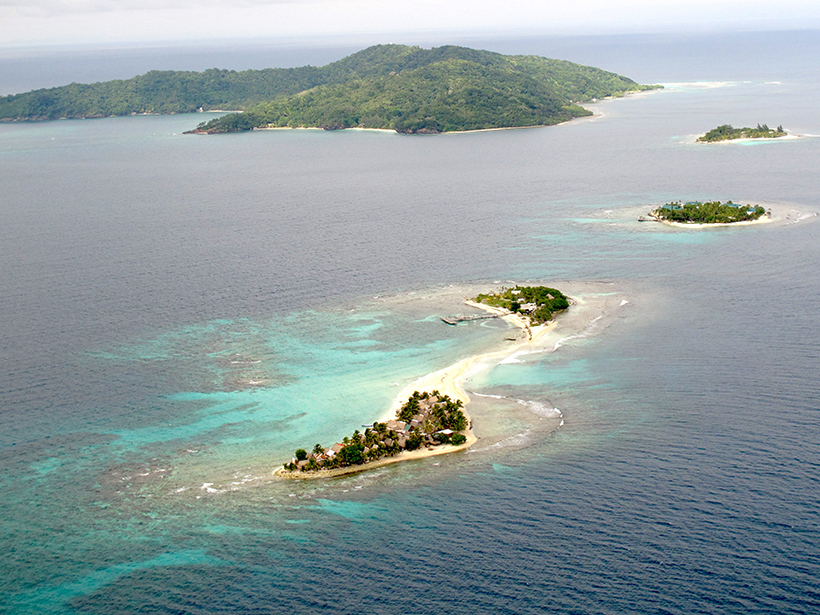Earlier this year, Healthy Reefs for Healthy People published its sixth report card on the status of the Mesoamerican Reef System (MAR). After an analysis of 286 sites in Mexico, Belize, Guatemala, and Honduras, the report concluded that the health of the system is poor, with an index of 2.5 out of 5. This conclusion was based on the status of the reef’s coral and fleshy macroalgae cover, as well as the biomass of herbivorous fish and commercial fisheries in the region.
“There is a poor fishing regulation in all four countries,” said Ian Drysdale, coordinator of Healthy Reefs for Healthy People in Honduras. “The decline in coral health that we experience is due to fishing, both industrial and artisanal.”
On top of overfishing, the Mesoamerican Reef suffers from coral bleaching events, in which corals expel the algae that provide most of their food and characteristic color. Stony coral tissue loss disease (SCTLD), also known as white syndrome, also plagues the reef. White syndrome is a condition that weakens the coral tissues, causing their death.
In the region of the Mesoamerican Reef near the Yucatan Peninsula, SCTLD has caused the death of up to 98% of some coral species. “When we approach the loss of 90% to 98% of the individuals of a particular species, we could well speak of the definitive disappearance of this species,” said Nallely Hernandez, regional deputy director of the National Commission of Natural Protected Areas (CONANP) and cocreator of the “White Syndrome Action Plan in the Caribbean Reefs of Mexico.”
In 2019, the Autonomous University of Mexico and Florida State University partnered with CONANP to carry out an experiment to understand the behavior of SCTLD. Although coral bleaching spreads systematically because of warming waters, white syndrome spreads without a specific pattern. “At first, [the disease] behaved radially, on the edges of the colony. But later, we realized that it could appear in isolated points, without warning or, in some cases, everywhere in the colony,” Hernandez said.
Besides documenting this erratic behavior, the results of the experiment have been inconclusive. Scientists suspect that the cause of SCTLD may be a virus or bacteria, which is enhanced by poor water quality. “Some banks, south of [the Mexican state of] Quintana Roo, still did not show signs of disease, perhaps because of its remoteness from the coast. This reinforces the hypothesis of the relationship of wastewater and pollution from the coast to the sea with the disease,” Hernandez added.
Water Treatment and Community Involvement
Local and federal government agencies are taking action to protect the Mesoamerican Reef. In 2018, Mexico added 10 species of parrotfish to its national registry of protected species. In February, Guatemala did the same and also included the butterflyfish, angelfish, and surgeonfish. These herbivorous fish consume macroalgae, which compete with corals for the reefs. Protecting the fish encourages corals to thrive.
“The solutions rest in the way we all behave in our everyday routines.”
Hernandez supports community-oriented approaches and reduced consumption. “The solutions rest in the way we all behave in our everyday routines. We need to make adjustments throughout the system, in order to understand the positive impact that we can generate with changes in our consumption habits.”
Drysdale, however, says overfishing limits the efficacy of both federal protections and individual consumption habits. “We are not just fishing efficiently, but we are also destroying critical habitats, such as mangroves and seagrasses,” he said.
“Unfortunately, the fishing industry has a lot of political and economic power, and its interference makes it difficult for us to work to protect our marine ecosystems,” he said.
—Jorge Rodriguez, Science Writer
Citation:
Rodriguez, J. (2020), Scientists support local activities to rescue the Mesoamerican Reef, Eos, 101, https://doi.org/10.1029/2020EO149171. Published on 15 September 2020.
Text © 2020. The authors. CC BY-NC-ND 3.0
Except where otherwise noted, images are subject to copyright. Any reuse without express permission from the copyright owner is prohibited.

